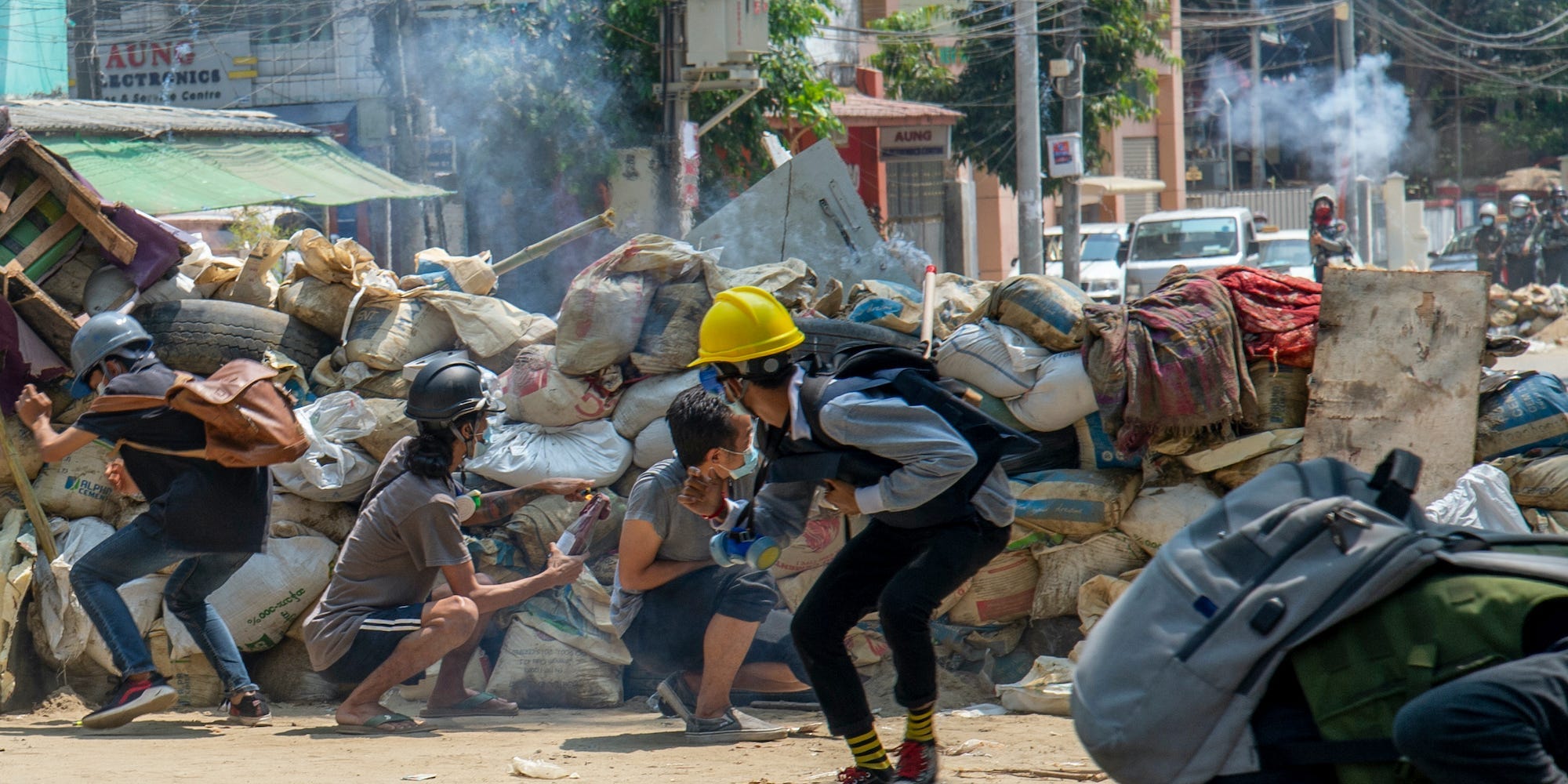
AP Photo
- Chinese textile factories have become a target during anti-coup protests in Myanmar.
- It's not clear who exactly is torching the facilities, but experts say it could be protesters.
- Protesters may be attacking the factories because China has not spoken out against the military.
- Visit Insider's homepage for more stories.
Chinese textile factories have become a target during anti-coup protests in Myanmar as China remains silent on the human rights violations in the country.
Several Chinese factories have come under attack in Myanmar this month and it's not yet clear exactly who is responsible. The Associated Press reported that protesters said they were not responsible for attacks on recent facilities, with some protesters speculating that the military itself could be behind the attacks as a way to justify declaring martial law in industrial zones,
However, China's state-run Global Times said protesters "incited by the West" attacked 32 factories, which caused about $30 million in damage, according to the AP.
Experts told Insider that it's likely protesters, or at least some protesters, are behind the attacks because they see the Chinese factories as symbols of China – a country that has not been outspoken against the military coup.
Nick Vyas, an associate professor at the University of Southern California and an expert in end-to-end global supply chain management, told Insider that Myanmar began to play a role in the global supply chain about a decade ago when international sanctions were lifted.
The garment industry then took off, mostly because the country was able to provide the cheapest labor.
"That's sort of where the story starts in terms of Myanmar really playing a big role in garment manufacturing. As China started to divest when Bangladesh didn't have enough capacity, Myanmar was really in a position - especially when you talk about Vietnam, Cambodia, Laos - where the wage rates were still substantially higher than that of Myanmar. It became sort of a very attractive value proposition," Vyas said.
However, China and other Asian countries actually own the majority of these garment factories or at least have some stake in them.
Christopher Tang, an expert on global supply chain management at the University of California Los Angeles, explained that the country did not have the initial supplies needed to make clothes, so the bulk of around 80% of fabric and zippers in Myanmar have been imported from China where they are sewn to clothing and exported, mostly to European brands such as Mango.
Tang explained that half of the factories in Myanmar are owned by foreign entities, especially China.
While he said only 1.1 million of the country's 54 million people work in these factories, the industry itself has seen rapid growth over the past decade, providing livelihoods for many.
Vyas said while it may not make sense why people who may earn their livelihoods from these factories would want to burn them down, he said many see these facilities as a roadblock to the change they want.
"The entire protest in Myanmar is led by the people and a big chunk of this group that's leading this protest, the ones who don't want to go back to the past and live under the dictatorial military rule, are the people working in the garment factories," Vyas said.
"These people are working six days a week, sometimes seven days a week and there are disputes sometimes about not being paid overtime, issues with benefits, and not being able to unionize. So even before this military protest and the coup, there has been some bad history with the previous government of Aung San Suu Kyi not standing up for worker's rights."
He explained that because the factories are owned by China, protesters view them as part of the cycle that prevents change. The cycle works like this: The garment workers provide cheap labor to these factories, which helps China grow its influence in Myanmar. Then, China's lack of support for protesters bolsters the military regime, which then cracks down on pro-democracy movements.
"They're holding the governments of the foreign entities accountable to say, 'Hey, speak against this thing because we just reverted 18 years of progress back into military rule and you're not saying anything and you just want the business to go on as usual and that is not acceptable,'" Vyas explained.
Both Vyas and Tang said it's likely these protests and the attacks on factories could have an impact on consumer goods, but it's not yet clear if prices will rise as a result. Tang said it's unlikely any of the corporations that source from Myanmar will pull their business out of the country, mostly because European countries are in support of protesters and the cost of production is still the cheapest.
"From the cost standpoint it's appealing. Also, the EU also likes to support poor countries to give them economic growth, especially all these factories - they hire lots of females and I think the goal is to create gender equity and social mobility for women. I think the EU would like to continue to support that, but then the politics need to stabilize," Tang said.
The situation, however, has not improved and protests have continued since the military, known as the Tatmadaw, took over on February 1, claiming there was mass voter fraud during the country's November elections.
Protesters took to the streets on practically a daily basis since then and have constantly been met with violence from security forces.
On Saturday, security forces killed over 100 people including children during clashes with protestors, the deadliest day so far.
Dit artikel is oorspronkelijk verschenen op z24.nl
